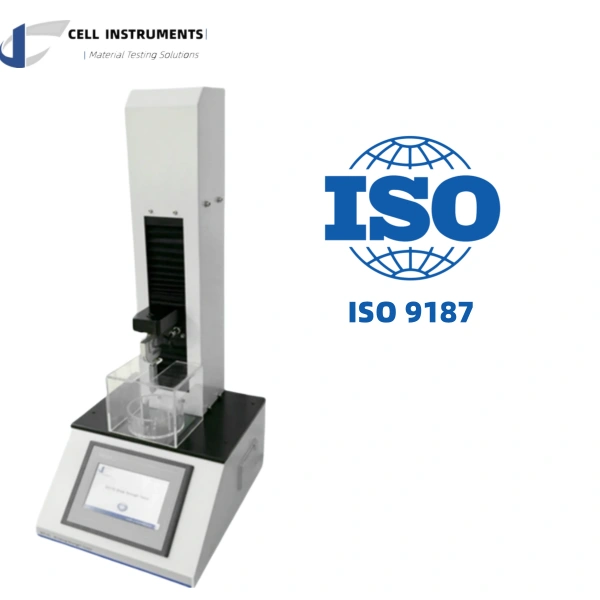Introduction
Accurate evaluation of ampoule mechanical strength tester is critical in pharmaceutical quality control. Glass ampoules used for injectable solutions must be strong enough to maintain sterility during transportation and storage, yet easy enough to break open without excessive force. ISO 9187 provides standardized test procedures to assess these qualities, especially breaking force measurement for glass ampoules. This article guides you through the complete testing procedure using the BST-01 Ampoule Mechanical Strength Tester from Cell Instruments, ensuring regulatory compliance and product safety.
Breaking Force Measurement for Glass Ampoules Using BST-01 Ampoule Tester
Breaking force is a key parameter in the mechanical integrity of ampoules. ISO 9187-1:2010 and ISO 9187-2 define strict criteria for measuring this force at the ampoule’s constriction, usually marked with a ceramic ring or colored pigment.
The BST-01 Ampoule Mechanical Strength Tester from Cell Instruments is specifically designed for this purpose. It provides precise and repeatable force measurements, in line with ISO 7500-1 and ISO 9187 specifications. With a controlled test speed of 10 mm/min and a 200 N force range, the BST-01 ensures reliable results for QC labs and manufacturing facilities.
Key Features of BST-01:
- Fully complies with ISO 9187 test method
- Integrated tensile force measurement system
- Programmable speed and data logging
- Ideal for breaking force measurement for glass ampoules
Using the BST-01 tester not only improves efficiency but also helps detect inconsistent annealing or weak hydrolytic resistance, which could compromise patient safety.
ISO 9187 Standards: Technical Testing Guidelines
ISO 9187 outlines the methodology and acceptance criteria for evaluating mechanical strength of ampoules. Below are critical elements you must follow:
Hydrolytic Resistance
Ampoules must meet ISO 4802 HC1 hydrolytic resistance class, ensuring internal surface durability against aqueous solutions.
Annealing Quality
Ampoules should not exhibit optical retardation beyond 50 nm/mm glass thickness. Improper annealing increases internal stress, leading to breakage during handling or transportation.
Breaking Force Test Procedure
1.Apparatus: Use a tensile tester conforming to ISO 7500-1, such as the BST-01 Ampoule Mechanical Strength Tester.
2.Test Speed: 10 mm/min or equivalent power rate of 20 N/s.
3.Force Range: At least 200 N.
4.Sample Preparation:
Condition at 20 ± 5 °C.
Select samples according to ISO 2859-1, inspection level S-4.
5.Setup:
Position the ampoule between two bars.
Apply force at 90° to its axis.
Breakage should be clean and force recorded.
Position and Stability of Breaking Point (ISO 9187-2)
The color-marked breaking point must be centered ±1 mm.
It must withstand:
30 minutes at 120 °C, then immersion in 30 °C water
Sterilization cycles and cleaning solvents
Failure to follow these guidelines may result in excessive breaking force, rendering the ampoule unsafe or noncompliant.
Why Mechanical Strength Testing Matters
Performing ampoule mechanical strength teste isn’t just about passing a regulation. It ensures:
- Patient safety: preventing glass particles or forceful breakage
- Manufacturing consistency: detecting flaws early
- Regulatory compliance: avoiding rejections and recalls
Real-world Example:
A leading pharmaceutical plant using BST-01 achieved a 30% reduction in ampoule breakage-related complaints after standardizing ISO 9187-compliant tests.
Choosing the Right Ampoule Mechanical Strength Tester.
Cell Instruments specializes in high-precision mechanical testing systems. The BST-01 Ampoule Mechanical Strength Tester is optimized for ampoule mechanical strength teste and supports automation, data traceability, and operator ease-of-use.
With decades of experience in medical device and pharmaceutical packaging testing, Cell Instruments offers tailored solutions for:
- Injectable ampoule quality control
- Material characterization
- Custom automated test setups
If your quality control workflow involves glass ampoules, the BST-01 provides unmatched accuracy, repeatability, and compliance.
Conclusion
Ensuring the mechanical strength of ampoules is essential to pharmaceutical integrity and patient safety. By adhering to ISO 9187 standards and utilizing advanced equipment like the BST-01 Ampoule Mechanical Strength Tester, manufacturers can confidently verify breaking force measurement for glass ampoules. Accurate testing not only guarantees product quality but also boosts regulatory compliance and customer trust.
For labs and manufacturers seeking ISO-compliant and reliable test solutions, Cell Instruments’ BST-01 is a proven choice to support your ampoule testing program.
